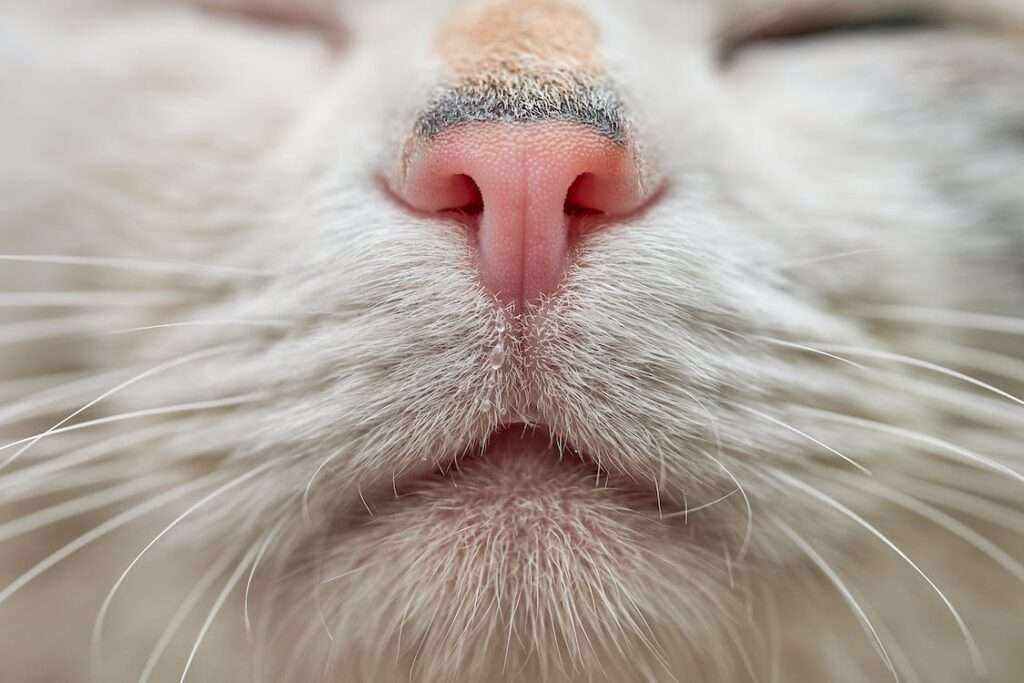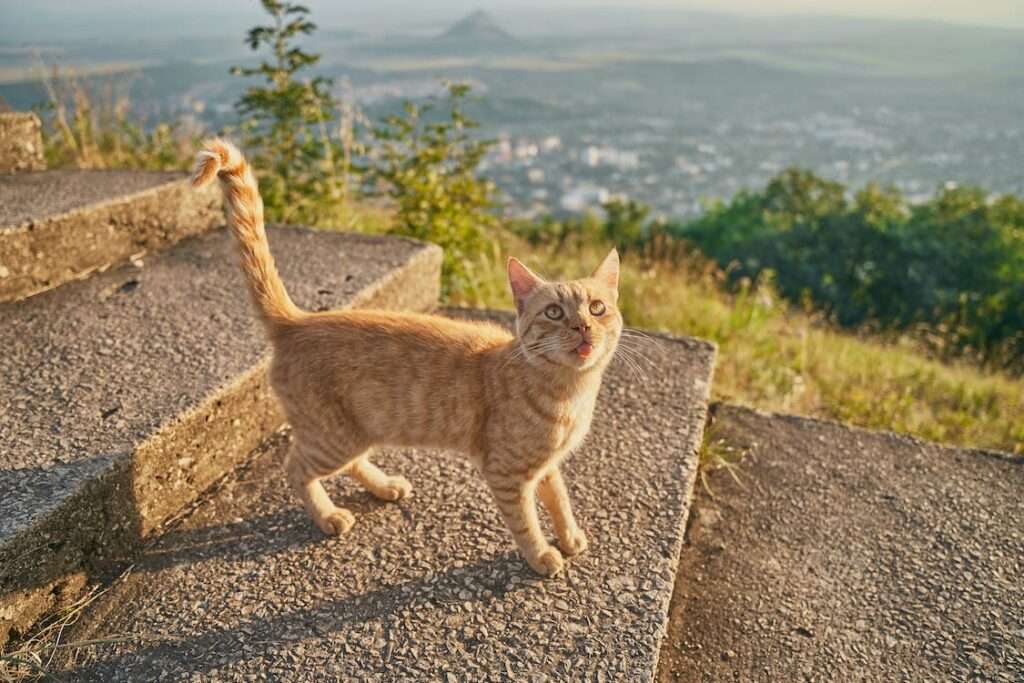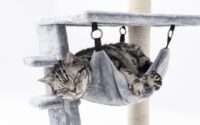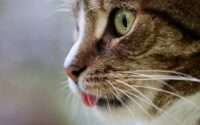Why Do Cats Open Their Mouth When They Smell? The Strange Reasons Behind It
Cats are fascinating creatures that have been captivating humans for thousands of years. One of the many unique behaviors of cats that often perplexes their owners is why they open their mouths when they smell something. This behavior is often mistaken for panting or a sign of distress, but in reality, there is a much more intriguing explanation.
In this article, we’ll dive into the science behind this behavior and explore the various reasons behind why do cats open their mouth when they smell. From the anatomy of a cat’s sense of smell to the potential health issues associated with this behavior, we’ll cover it all. So, if you’ve ever wondered about the captivating enigma behind this peculiar quirk, continue to read on!
The Anatomy of a Cat’s Sense of Smell

A cat’s sense of smell is truly remarkable and far superior to that of humans. To comprehend why cats open their mouths when they smell, it’s essential to delve into the intricacies of their olfactory system. Cats possess a highly developed olfactory system, boasting over 200 million olfactory receptors, while humans only have around 5 million.
At the core of a cat’s sense of smell lies the olfactory epithelium, a specialized tissue located within the nasal cavity. This epithelium houses the vast array of olfactory receptors, serving as the foundation for a cat’s acute sense of smell. These receptors allow cats to discern and process an extensive range of scents, enabling them to differentiate between various odors with remarkable precision.
In addition to the olfactory epithelium, cats possess a unique sensory organ called the vomeronasal organ, or Jacobson’s organ. Situated in the roof of their mouth, this organ plays a pivotal role in detecting pheromones—chemical signals used by animals to communicate with one another. The vomeronasal organ complements the olfactory epithelium, further enhancing a cat’s olfactory capabilities.
Together, the olfactory epithelium and vomeronasal organ enable cats to detect and analyze scents in ways that humans can hardly fathom. Their heightened sense of smell grants them exceptional hunting prowess and allows them to navigate and interact with their environment on a whole different level. But why do cats open their mouths when they smell?
The act of opening their mouths while smelling is known as the flehmen response. This behavior serves a specific purpose—by opening their mouths, cats direct the scent molecules to their Jacobson’s organ, where the vomeronasal organ is located. This action enables them to concentrate and focus on specific scents, intensifying their ability to interpret and process olfactory information.
The Reasons Behind a Cat Opening Their Mouth When They Smell
Have you ever noticed your cat opening their mouth while taking in a scent? It turns out there are a couple of intriguing reasons behind this behavior. One of them relates to regulating their body temperature. Unlike humans who can sweat, cats rely on different methods to cool down.
When a cat opens their mouth and pants, it increases the airflow over the moist tissues in their mouth, nose, and throat, effectively dissipating heat. This mechanism becomes especially important during warm weather or when they engage in physical activities.
But there’s more to it than just temperature regulation. Opening their mouth also serves to enhance a cat’s already impressive sense of smell. By parting their jaws, cats increase the flow of air to the vomeronasal organ, also known as Jacobson’s organ, located in the roof of their mouth. This special organ allows them to detect and analyze pheromones—chemical signals used by animals for communication.
When a cat encounters an interesting scent, such as the aroma of potential prey, they open their mouth to channel the scent molecules directly to the vomeronasal organ. This intensifies their olfactory perception, helping them to discern subtle scents and gather vital information about their surroundings.
So, next time you witness your feline friend opening their mouth while sniffing the air, marvel at their multifaceted nature. They are not only regulating their body temperature but also engaging their highly sophisticated sense of smell. It’s yet another demonstration of their remarkable adaptations that enable them to thrive in their environment.
Common Scents That Trigger a Cat’s Open-Mouth Behavior
So what scents might trigger a cat to open their mouth when they smell them? One of the most widely recognized scents is catnip. Catnip is a plant in the mint family that contains a chemical compound called nepetalactone, which is known to cause a euphoric reaction in cats. When cats smell catnip, they often roll around in it, rub their face on it, and even chew on it. They may also open their mouth and appear to be “smiling” or panting.
However, catnip isn’t the sole aroma that can elicit this captivating open-mouth behavior. Some cats may exhibit the same response when encountering strong scents like perfumes or cleaning products. These powerful fragrances can be overwhelming to their keen noses, and opening their mouth helps them process the scent more effectively, allowing them to analyze it in greater detail.
Intriguingly, pheromones can also prompt a cat’s open-mouth behavior. Pheromones are chemical signals that cats use to communicate with one another. When a cat catches a scent of these captivating messages, they might find themselves unable to resist the urge to open their mouth, facilitating a deeper exploration of the scent’s intricate nuances.
Additionally, certain food aromas have been known to elicit an open-mouth response in cats. The delectable scents wafting from their favorite treats or a freshly prepared meal can evoke sheer excitement, enticing them to savor every moment with an open mouth and heightened anticipation.
Lastly, the scent of their beloved human can also trigger this intriguing behavior. Cats have a remarkable ability to associate scents with emotions and memories. So, when they catch a familiar scent, whether it’s from your clothing or belongings, their open-mouth response may reflect a mix of curiosity, comfort, and a desire to connect with you.
Each cat possesses their own unique preferences and sensitivities to scents, so it’s essential to observe your feline companion’s behavior and learn what aromas entice them the most. Remember, if you introduce new scents to your cat’s environment, ensure they are safe and non-toxic. Your cat’s well-being is always a top priority as you explore the scents that bring joy to their fascinating world.
Health Issues Associated with Open-Mouth Behavior
While it’s true that open-mouth behavior is often a natural and harmless part of a cat’s behavior, there are instances where it could indicate an underlying health concern. If you notice your cat frequently opening their mouth and displaying panting-like behavior, it’s crucial to pay attention to any accompanying symptoms they may exhibit, such as lethargy, loss of appetite, or coughing.
Respiratory distress is a common health issue that can lead to open-mouth behavior in cats. Factors such as allergies, infections, or even heart disease can contribute to respiratory distress. If you suspect your feline companion is experiencing difficulty breathing or panting excessively, it’s vital to seek prompt veterinary attention to ensure their well-being.
Dental problems can also be associated with open-mouth behavior in cats. Just like humans, cats can develop issues with their teeth and gums, such as periodontal disease or broken teeth. These conditions can be painful and cause your cat to open their mouth in distress. Implementing regular dental care, including teeth brushing and scheduling professional cleanings, can help prevent these problems and keep your cat’s oral health in check.
Remember, observing changes in your cat’s behavior and being proactive about their health is paramount. If you notice any concerning signs or if your cat’s open-mouth behavior persists or worsens, don’t hesitate to consult with a veterinarian. Their expertise and guidance will help ensure that your feline companion receives the care they need to maintain optimal health and well-being.
How to Encourage Safe Smelling Behavior in Your Cat

Open-mouth behavior during smelling is a natural aspect of your cat’s behavior, but it’s crucial to ensure their safety and well-being. By encouraging safe smelling behavior, you can enhance their overall health and happiness. Here are some tips to create a cat-friendly environment that fosters their natural instincts.
First and foremost, provide your feline friend with a safe and stimulating environment. Cats love to explore and engage their senses. Ensure they have access to different areas of your home, such as window perches or designated climbing structures, where they can observe the outside world and take in a variety of scents. This allows them to satisfy their curiosity and engage in their natural behaviors.
To further stimulate their sense of smell, offer interactive toys and puzzles designed to engage their hunting instincts. These toys can incorporate hidden treats or catnip-infused elements that entice your cat to sniff, search, and play. Not only will this keep them mentally and physically stimulated, but it will also provide an outlet for their natural behaviors.
Introducing scents, such as catnip or pheromones, can create a positive and enriching environment for your cat. Catnip, with its alluring aroma, can bring joy and excitement to playtime, encouraging your cat to explore, roll, and engage with their toys. Pheromones, on the other hand, can help create a sense of calm and security, reducing stress and promoting overall well-being.
It’s important to remember that each cat has unique preferences, so observe their reactions to different scents and toys. Some cats may respond more strongly to catnip, while others may find comfort in pheromone sprays or diffusers. Tailoring the environment to your cat’s individual needs will ensure they feel safe and content.
Conclusion
In conclusion, the captivating behavior of cats opening their mouths when they encounter scents is a fascinating topic that deepens our understanding of these remarkable creatures. By delving into the scientific intricacies behind this behavior and being aware of any associated health concerns, we can enhance the care and well-being of our cherished feline companions.
At BarkLikeMeow, we appreciate the unique traits and behaviors that make each cat special. By staying informed and attentive to their needs, we can create an environment that nurtures their natural instincts and promotes their overall happiness. So, whether it’s providing a stimulating playtime experience, ensuring their dental health is in check, or encouraging safe smelling behavior, your cat will thrive under your loving care.
Remember, your cat’s health and happiness are at the forefront of everything we do. By embracing their individuality and catering to their sensory world, we strengthen the bond we share with them. Let us continue to celebrate the enchanting behavior of our feline friends and cherish every moment we spend together.
Frequently Asked Questions
Q: Why do cats open their mouths when they smell something?
A: Cats have a special sensory organ called the Jacobson’s organ, located in the roof of their mouth. When a cat opens its mouth while smelling, it is called the flehmen response. This behavior helps them to analyze and process scents more effectively by directing the scent molecules to the Jacobson’s organ for a more accurate assessment.
Q: Do all cats exhibit the flehmen response?
A: While most cats display the flehmen response, it’s more commonly observed in adult cats. Not all cats may exhibit this behavior, but it is particularly noticeable in certain situations, such as when they encounter a new scent or are investigating a strong odor.
Q: Are there specific scents that trigger the flehmen response?
A: Cats often exhibit the flehmen response when they encounter strong or intriguing scents, such as pheromones from other cats or urine markings. However, the specific scents that trigger the response may vary from cat to cat. Some cats may also show this behavior when they encounter unfamiliar objects or substances.
Q: Is the flehmen response exclusive to domestic cats?
A: No, the flehmen response is observed in various species of animals, including big cats like lions, tigers, and cheetahs. It is a natural behavior in many mammals and serves a similar purpose of enhancing their olfactory perception.
Q: Is the flehmen response a cause for concern?
A: In most cases, the flehmen response is a normal behavior and not a cause for concern. However, if you notice any other abnormal behaviors or signs of distress in your cat, it is advisable to consult with a veterinarian to rule out any underlying health issues.
Q: Can the flehmen response be trained or controlled?
A: The flehmen response is an instinctual behavior in cats, and it cannot be trained or controlled directly. It is a natural part of their olfactory system. However, providing your cat with various scents to explore and experience can help stimulate their senses and encourage natural behaviors like the flehmen response.
Q: Are there any risks associated with the flehmen response?
A: Generally, the flehmen response is harmless. However, it’s important to ensure that the substances or objects your cat is investigating are safe and non-toxic. Avoid exposing your cat to harmful chemicals or substances that could potentially be ingested or cause harm.
Q: Is the flehmen response related to a cat’s sense of taste?
A: While the flehmen response involves the mouth, it is primarily associated with a cat’s sense of smell rather than taste. The behavior allows the cat to access the Jacobson’s organ, which helps in analyzing scents more effectively. Taste is a separate sensory function for cats and is primarily detected by their taste buds.
Q: Can the flehmen response indicate anything about a cat’s health?
A: In most cases, the flehmen response is a normal behavior. However, if you notice any sudden changes in your cat’s behavior or an excessive display of the flehmen response, it’s advisable to consult a veterinarian. It could potentially indicate an underlying medical condition that requires attention.
Q: How can I encourage my cat’s natural behaviors like the flehmen response?
A: Providing environmental enrichment, such as introducing different scents and toys, can help stimulate your cat’s natural behaviors, including the flehmen response. Offering opportunities for exploration, interactive play, and access to safe outdoor spaces (if applicable) can also support their natural instincts and behaviors.
References
- International Cat Care. (n.d.). Cat Communication. Retrieved from https://icatcare.org/advice/cat-communication/
- Cat Behavior Associates. (n.d.). How Cats Use Scent Communication. Retrieved from https://catbehaviorassociates.com/how-cats-use-scent-communication/
- The Spruce Pets. (n.d.). Flehmen Response in Cats. Retrieved from https://www.thesprucepets.com/flehmen-response-in-cats-553917
- PetMD. (n.d.). Cat Sneering: What Is the Flehmen Response? Retrieved from https://www.petmd.com/cat/general-health/cat-sneering-what-flehmen-response





